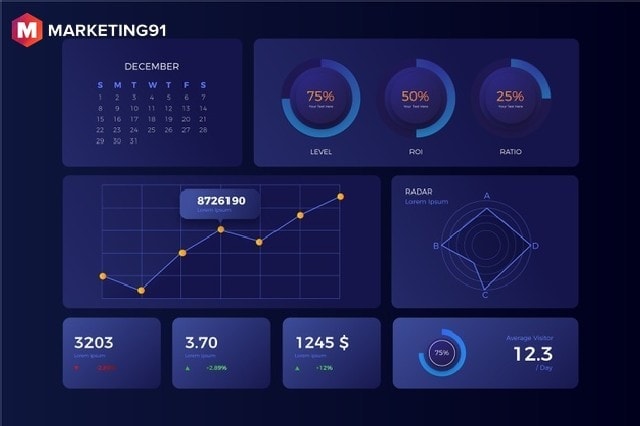Qualitative research is scientific research used to collect non-numerical data through different qualitative research methods like observational methods, Face-to-Face interviews, case studies. Qualitative research methods are used to obtain detailed answers to the questions. Participants of the research are asked open-ended questions rather than asking close-ended questions through surveys and questionnaires.
In qualitative research, a researcher gives more importance to the concepts, definitions, meanings, and detailed description of things and give less stress to figures and numbers. Qualitative research methods explain how and why something happens and do not answer what and how much happens.
For example, if a store manager wants to know the reason behind the declined daily sales rate, then hr should conduct qualitative research such as face-to-face interviews of potential customers, observing the behavior of customers in the store. You can select random customers and can request them to take part in the interview process.
By conducting qualitative research, you would know about the reason behind the declined sales rate, such as high prices, lack of items, etc. By knowing these reasons, you can work on them and boost your sales again. The answers to such questions can only be determined through interaction with potential customers and observational study.
Have you ever considered how qualitative research adapts to dynamic environments?
Quick Tip: When conducting qualitative research, it’s essential to remain adaptable. Tools like NVivo or ATLAS.ti offer flexible analysis options, allowing researchers to handle unstructured data effectively. These software solutions support diverse data types, including text, audio, and video, facilitating a deeper insight into complex research questions (Source: Research Methods Knowledge Base, 2023).
Brief Case Study: A notable example of successful qualitative research was carried out by Procter & Gamble. They used ethnographic studies to understand consumer habits in different cultures, which led to the development of more effective marketing strategies for several product lines, particularly in emerging markets like China and India. This approach helped P&G increase its market share significantly in these regions over the past decade (Source: Harvard Business Review, 2022).
Therefore, in market situations, qualitative research methods play a crucial role. In this article, you will learn about the different characteristics of qualitative research.
Table of Contents
1. Real-world Setting
The real-world setting is the first characteristic of qualitative research. In qualitative research methods like observation method, ethnographic research, focus group, one-to-one interviews, the behavior of the participants of study is observed, and the conclusion is drawn based on their answers and their behavior.
For example, A teacher will conduct qualitative research if he wants to know about the reason for the declining performance of students in the class. Qualitative research is conducted in natural settings to get real information.
2. Researcher Plays an important role
A researcher is a person who performs qualitative research. Qualitative research can be conducted by a group of people or by an individual. The purpose of a researcher is essential in qualitative research. The researcher of qualitative research is responsible for choosing the research method and for making a plan to conduct effective research.
The researcher is also responsible for participating in the study to make the right observations. He participates in the research and engages the participants in the study. He also explains the procedure of research to the participants and answers their queries.
3. Different Research methods
Another vital characteristic of qualitative research method is the various methods of research. For example, focus group, face-to-face interview, observation research methods, case study, content analysis, ethnography, phenomenology, ground theory, group discussions.
Each qualitative research method has different significance and is used for different scenarios and research situations. Sometimes, researchers make the use of more than one qualitative research method to obtain the accurate output. Research methods like a case study and Content analysis are also used to compare the results of quantitative research.
4. Complex reasoning
An essential characteristic of the qualitative research method is that it is beneficial for complex reasoning. Sometimes, there are search situations which are required to have complex rationale to get the right results rather than direct statistical answers.
For example, if a restaurant owner wants to know about what kind of entertainment people prefer at different hours of the day and why then he is required to adopt one of the qualitative research methods to understand the psychology of customers behind the choice of their entertainment.
In addition to this, qualitative research methods are also used to explain the outcome of quantitative research methods.
5. Participants meanings
In qualitative research, like the researcher, the role of a participant is also very important. During the whole research process, the focus of a researcher is to understand and determine the meaning that a participant brings to the research rather than the definition given or thought by the researcher based on the literature reviews.
Based on the different perspectives of participants, different meaning of research is observed.
6. Flexible
Qualitative research is flexible. It can change at any stage of the research and based on the change, the course of research might also get changed. Therefore, qualitative research is used in such a scenario where the flexible nature of research is acceptable.
7. Reflexivity
In qualitative research, the researchers share everything about themselves like their background and their purpose of research with the participants. Reflexivity also makes them participate In the research openly and willingly.
8. Holistic Account
The purpose of conducting qualitative research is to paint the larger picture. While doing qualitative research, the researcher focuses on different perspectives and determine various factors involved in the research.
The research works to develop a complex description of the research problem. A researcher should not try to identify a cause and effect type relationship between two or more factors but should try to establish a complex cause and relationship between different elements.
9. Ongoing data analysis
The analysis of data in qualitative research does not take place at the end of the completion of the research process. Data analysis is an on-going process in the qualitative research method.
The researcher can analyze as well as draw conclusions, and based on the outcome of the research process is modified.
10. Purposeful selection of participants
In qualitative research, participants are selected randomly from a carefully chosen segment of potential participants. The persistent range of participants increases the accuracy of the outcome of the research.
Therefore, the selection of participants is an important stage of qualitative research, unlike quantitative research, where participants are chosen randomly.
11. Emergent Design
A unique characteristic of qualitative research is its new design. That means a qualitative research method can remain the same as decided by the researcher at the beginning of the research process. The research process changes at every stage of the research. Sometimes, change in the research process changes when the researcher starts collecting data for the research problem.
This can result in the difference in the methods being used for the research and sometimes, the research problem is altered and results in a completely new research problem. Because of this, the researcher is required to be ready to change in the whole research process at any time or phase of the research.
The primary purpose of qualitative research methods is not to determine a quantitative answer but to be able to establish an understanding of the problem and to find out in detail about it.
Liked this post? Check out the complete series on Market research






thank you sir,i need notes on digital maketing
Uses of Qualitative Research